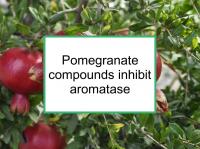A new study has demonstrated that ellagitannin compounds derived from pomegranate can reduce estrogen receptor positive (ER+) proliferation by inhibiting aromatase activity. Estrogen stimulates the growth of ER+ tumors. Androgens are converted into estrogens in the body by the aromatase enzyme, thereby promoting such breast cancer.
Pomegranate fruit, which is a rich source of ellagitannins, has attracted notice because of its reported anticancer and anti-atherosclerotic properties. Pomegranate ellagitannins hydrolyze upon consumption, releasing ellagic acid, which is then converted to various derivative compounds by microflora in the gut.
In the study, 10 ellagitannin-derived compounds were tested. All were found to exhibit antiproliferative activity, and six were found to have anti-aromatase activity, the strongest of which was demonstrated by urolithin B. Further testing demonstrated that urolithin B significantly inhibited testosterone-induced MCF-7aro cell proliferation. MCF-7aro breast cancer cells are estrogen receptor positive/aromatase positive and demonstrate increased cell proliferation in the presence of testosterone. The authors conclude that pomegranate ellagitannin-derived compounds have potential for the prevention of estrogen-responsive breast cancers.
